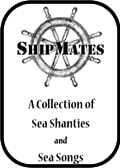Shanties
Here are the first four sets of Shanties and Sea Songs for the Bundanoon Shipmates Shanty Group combined.
Books with the scores and with chords are in production. Recordings will be added over time to help shipmates learn the tunes and words.
Words and Melodies
A link to a booklet that includes the full shantyman and crew words and the melodies.
Butto n
n
Words and Chords
A link to a booklet that includes the full shantyman and crew words with accompaniment chords.
Not available yet
Types of Shanties
There were three principal types of shanties
- short-haul, or short-drag, shanties, which were simple songs sung for tasks that required short bursts of energy and a quick pull as when unfurling or shortening a sail. With steady rhythm, the crew worked in unison to get the job done safely and efficiently; critical in rough seas.
- halyard shanties, for jobs such as hoisting sail, in which a pull-and-relax rhythm was required over a long period of time, as when raising or lowering a heavy sail. (e.g., Blow the Man Down, Drunken Sailor, Haul Away Joe.)
- windlass, or capstan, shanties, which synchronized effort for longer repetitive tasks that needed the appropriate rhythm as when raising or lowering the anchor, pushing the capstan bars (eg Shenandoah, Rio Grande, A-Roving, South Australia.)
Whaling Songs
- Whaling was a cruel and dangerous occupation. The giants of the ocean plundered for whale oil used mainly for lubrication and reflect the harshness and danger of working aboard a whaling ship. Typically at sea for two years or more, a whaler’s life was often short-lived and the work was gruelling and wretched. It was the whaling shanty that gave them strength and courage to stay the course in the midst of the worst circumstances, foul stench and life-threatening risks. A notable example is “Bonny Ship the Diamond”.
Some Background
As the change-over to steam driven ships moved on with the imperatives of speed and reliability, the sailors that sang the work-songs of the sailing ships became elderly and if it weren't for the work of folk song collectors their songs would have died with them.
The best known sea shanty collectors include:
- Stan Hugill (1906-92)
Known as ‘The Last Shantyman’, Stan Hugill was a sea shanty collector from Merseyside, the epicentre of England’s shanty tradition. He spent 23 years at sea, including a stint as the shantyman on the final voyage of Garthpool, Britain’s last commercial sailing ship. After retiring in 1945, he transcribed and recorded the shanties he had learnt at sea. He also penned several books on shanties, which remain a go-to resource for singers today - Alan Lomax (1915-2002)
Alan Lomax collected and recorded songs, particularly from the African-American music traditions. In 1935, he travelled with folklorist Mary Elizabeth Barnicle to record work songs and interview sponge fishermen on Andros Island in the Bahamas, continuing that work across the Caribbean and West Indies. - Cicely Fox Smith (1882-1954)
A leading nautical poet of the early 20th century, Cicely Fox Smith also collected sea shanties, publishing a book which included ‘Whiskey Johnny’ and ‘Blow the Man Down’. It's believed that she travelled on a steamship to Montreal with her sister in 1911, and then continued on to British Columbia. While living and working in Vancouver Island, she spent time talking to sailors. It was here that she transformed the stories of these sailors into her poetry and written work. - Australian collectors, mostly inspired by communist leaning, recorded the work songs from all areas of work which included shanties. John Meredith amongst others recorded a number of sailors singing both work and fore-bitters songs.
Finding Shanties
Shanty Singing Groups are found all round the country these days. They include a wide range of ages, They often congregate in a pub. Some are for male voices, some encourage both male and female contributors, and some are exclusively females. Some use a generic repertoire and others explore the options in different ways, eg ShipMates has a bias towards shanties with an Australian connection.
An internet search will reveal possibilities close to home.
The Redfern Shanty Group, the Kiama Shanty Singers and the Canberra Shanty Group are all strong and encouraging.
Some Exponents of Shanties
Shanties have often been sung at Folk Festivals around Australia, both on stage and in sessions.
Some of the exponents have included:
- Danny Spooner
- Alex Hood
- John Warner
- The Roaring Forties
- 40 Degrees South
 n
n